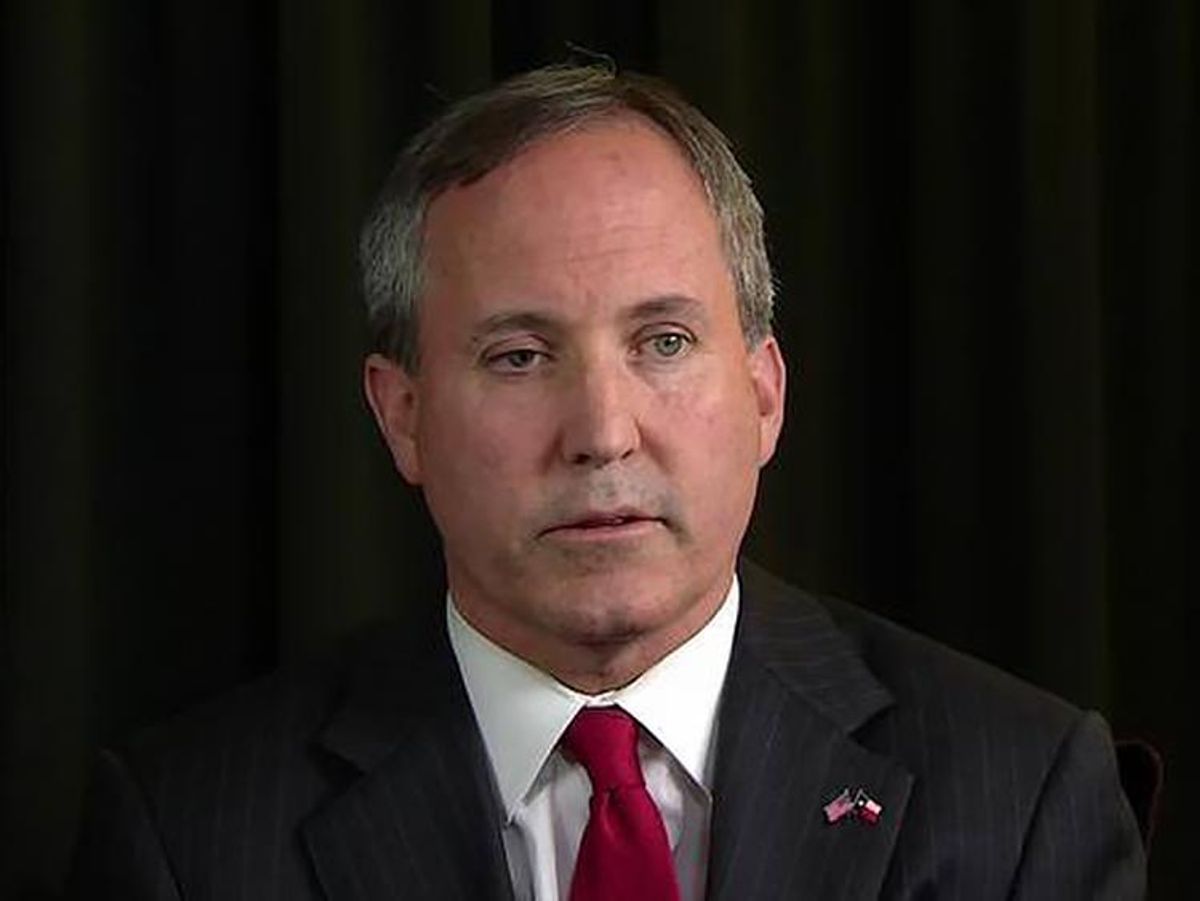The state of Texas has launched another legal salvo in the battle over equal access for transgender Americans.
This time, Texas Attorney General Ken Paxton, leaders from four other states, and a handful of religious organizations are taking aim at the trans-inclusive health care provisions of the Affordable Care Act, also known as Obamacare.
In a 79-page complaint filed Tuesday in the U.S District Court for the Northern District of Texas, the plaintiffs contend that the ACA's requirement that health care providers offer trans-inclusive services violates the religious freedom of doctors, nurses, and other medical professionals who operate with an "infusion of faith into healthcare." In implementing the ACA, the Department of Health and Human Services has unlawfully attempted to redefine the word "sex" "to include 'an individual's internal sense of gender, which may be male, female, neither, or a combination of male and female, and which may be different from an individual's sex assigned at birth,'" reads the complaint, citing language in the ACA.
The suit, which also lists as plaintiffs the states of Wisconsin, Kansas, Kentucky, and Nebraska, and three Christian health care providers or practitioner groups, also challenges the ACA's provision requiring insurance providers to cover abortion services. The faith-based groups filing suit, the Franciscan Alliance, Specialty Physicians of Illinois, and the Christian Medical and Dental Associations, particularly take issue with the fact that the ACA does not include a "religious exemption" that allows providers to refuse to provide certain services if those services violate the tenets of the business's "sincerely held religious belief."
In his comprehensive summary of the newest lawsuit, BuzzFeed News legal editor Chris Geidner notes that the religious groups listed in the lawsuit are being represented by the Becket Fund for Religious Liberty, a right-wing organization that has taken an active role in leading faith-based challenges to the ACA. Geidner crucially notes that the Becket Fund led the successful challenge to the "contraception mandate" issued by HHS in the controversial Supreme Court case known as Hobby Lobby v. Burwell.
The case has been assigned to Judge Reed O'Connor, an appointee of President George W. Bush who late Sunday granted a nationwide injunction barring enforcement of the Obama administration's nonbinding guidance for schools with transgender students. O'Connor's injunction prevents the administration from taking any action to enforce the guidelines -- despite the fact that the administration itself admitted that the guidelines were not yet being enforced.
The central complaint of the newest lawsuit alleges that an HHS rule proposed in September "seeks to override the medical judgement of healthcare professionals around the country." That rule, which clarified the nondiscrimination policies contained in Section 1557 of the ACA, allows trans and gender-nonconforming patients to file discrimination complaints against nonaffirming providers. Other provisions of the ACA had already determined that insurance companies could not deny medically necessary treatment to transgender people, and several states had proactively done away with long-standing blanket bans on insurance coverage for gender-affirming treatment.
Lambasting the regulations as "dramatic new requirements" imposed by HHS, the lawsuit claims that doctors will be forced to "perform controversial and sometimes harmful medical procedures ostensibly designed to permanently change an individual's sex -- including the sex of children." The suit continues, "Under the new Regulation, a doctor must perform these procedures even when they are contrary to the doctor's medical judgment and could result in significant, long-term medical harm."
To be clear, while some gender-affirming social or clinical treatment can be initiated in young patients, most doctors around the country will not perform the specific "drastic" surgeries alluded to in the suit until the patient is at least 18. (Standards of care endorsed by the World Professional Association for Transgender Health also adopt this approach.) Trans-competent clinicians are increasingly using hormone blockers as a way to help trans youth delay puberty, and existing research on this practice indicates that the side effects are minimal and can be reversed once a patient stops taking the blockers. Some doctors will begin hormone therapy for trans youth as young as age 13, notes PBS, but the more common practice is not to prescribe "cross-sex" hormones until the patient is at least 16 . So the likelihood that any doctor would be "forced" to perform any particular surgery on a minor is incredibly slim, as most responsible medical professionals will advise patients to delay irreversible surgeries until at least age 18.
Nevertheless, the suit continues with its hyperbolic rhetoric, claiming that the regulation "undermines the longstanding sovereign power of the states to regulate healthcare." The complaint contends that all health care professionals at state-run facilities must "participate in medical transition procedures (including hormone therapy, plastic surgery, hysterectomies, and gender reassignment surgery), and [must] cover those procedures in the States' health insurance plans, even if a doctor believes such procedures are harmful to the patient."
While health care facilities and state-run insurance agencies indeed cannot deny transgender people appropriate care, medical professionals regularly differ on the best course of treatment for a particular patient, and obtaining a "second opinion" is common when seeking major surgery or other treatment. The suit offers no justification for its fearful claim that transgender people will swarm Christian doctors and demand gender-affirming surgery.
The suit also makes no mention of the staggering health disparities faced by transgender people nationwide. According to a 2015 report from the National LGBTQ Task Force that surveyed trans and gender-nonconforming people nationwide, 28 percent of transgender people reported harassment when accessing health services; 19 percent reported being refused care based on gender identity; and a staggering 50 percent reported having to teach their providers how to provide them with adequate care.
Continuing its tendency toward oversimplification, the suit summarizes its central argument in one "very simple question of statutory interpretation. Can HHS redefine the term 'sex' to thwart decades of settled precedent and impose massive new obligations on healthcare professionals and sovereign States?" The complaint then answers its own query: "The answer is 'no,' and the new Regulation must be set aside as a violation of the Administrative Procedure Act and multiple other federal laws and constitutional provisions."
That reference to the Administrative Procedure Act echoes procedural complaints that were accepted by Judge O'Connor in a similar suit filed by 13 states, led by Texas, seeking to block the administration's guidance surrounding the legal rights of transgender students. As in that case, the lawsuit filed Tuesday claims that the Department of Health and Human Services did not go through proper channels to obtain public feedback on the ACA's trans and abortion policies, even though the HHS rule in question did indeed go through a public comment period, beginning last September, before it was finalized.
Additionally, the assertion that HHS abruptly and without precedent sought to redefine the statutory meaning of the word "sex" is specious, at best. Over the past several years, numerous federal agencies and courts have determined that existing legal prohibitions on discrimination based on sex also prohibit discrimination based on gender identity, which growing legal and scholarly opinion has identified as a key component of how society understands "sex."














































































